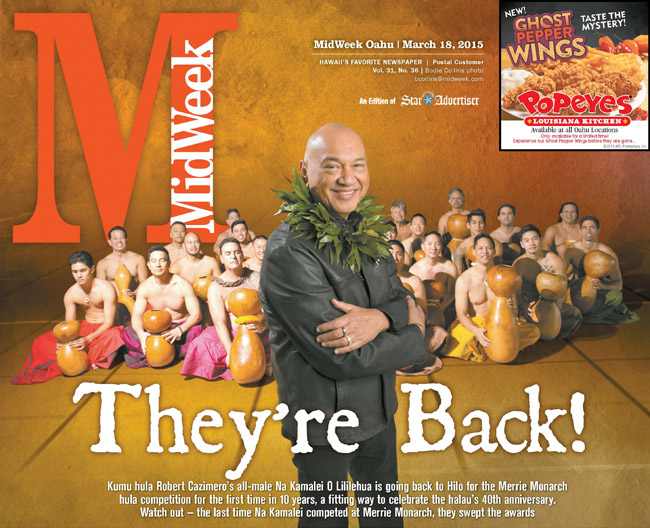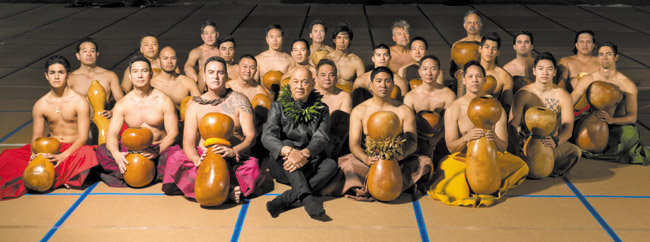They’re Back!
Despite enjoying his travels, coming home always makes for a moment of gratitude: “To get off the plane and, of all the beautiful people you saw around the world, that person you see when the plane door opens is drop-dead gorgeous and you know you’re home.”
With Merrie Monarch keeping him in the Islands, Cazimero has a lot going on at home this spring. Say happy 66th to the living legend March 20. The next day, he and Na Kamalei celebrate at Hawaii Theatre with “Open Windows ― An Evening with Robert Cazimero,” where he will be joined by a lineup of special guests, including ladies of Royal Dance Company, Raiatea Helm and new musical trio Hu‘ewa (hawaiitheatre.com). “Open Windows” will give Cazimero and Na Kamalei a joyous send-off as they prepare for Merrie Monarch.
mw-cover-hero-031815r-cazimero-bc-1
And how does one prepare? “You use all the tricks in the book,” answers Cazimero. “You hope for dreams. You hope for people to give you suggestions. You research. You remember. You project, and it has a tendency of sometimes coming to you more than you going to it. How do you prepare? Be open. Be open to accepting the gifts that are coming your way.”
He says his 2005 award-sweep doesn’t leave him with added pressure. In his salad days, Cazimero grabbed the proverbial pua‘a by its tusks, but now he says, “Don’t sweat the small stuff.”
He repeats a lesson shared by friends who ride in Kamehameha Day and Aloha Festivals parades:
“You look great at the beginning, but the real reward is that, when we get to the end of it, the flowers are still in place, no one has fallen off the horse, and you can be happy and proud with what you’ve done.
“When I went to Merrie Monarch in the very beginning, I said we’re doing this for the culture, for the love of hula. But that was bull—because I was out there for the ego of it.
“One of the best lessons Na Kamalei and Robert Cazimero ever learned was losing at Merrie Monarch, and in those days, talk about ego, second place was losing. Is that from the Western idea that if you’re not the best football team or athlete at the Olympics, then you have failed? Well, I’m happy to acknowledge the credo that, if we get to the end of the park and all the flowers are still on and no one has fallen off the stage, we’ve made it.”
Appreciating the bigger picture is something Cazimero seems to be doing a lot lately. For instance, he relishes “competing” with his former students who now have halau of their own, because he doesn’t see it as competing. He sees it as propagating the style of hula passed on to him by his kumu. He reminisces about the day when hula styles were unique and just by watching someone dance, you could tell which halau that student belonged to.
Today, Cazimero sees a melding of styles.
“I know it’s a different time, but there’s a great strength in knowing, really knowing, where you come from,” he says. “Do you know who your teacher is, and who was her teacher’s teacher and that teacher’s teacher’s teacher? Because I can tell you mine. I want to know yours.”
He feels his kumu’s presence constantly, and gives her credit for molding him into the person he is today. He still dances beside his students, bringing back fond memories of Aunty Maiki:
“I remember how it felt to dance next to my kumu. It was such a privilege, it was like winning the biggest Boy Scout medal.”
He says the kumu-student relationship is far deeper than teacher and student: “Whether you expect it or not, you end up being the parent, doctor, nurse, mother, father, brother, sister … everything.”
In the fabric of that bond, it’s considered taboo to share jurisdiction with other halau, but in the spirit of not sweating the manini stuff ― after 40 years, you have a tendency to see things differently, he notes. For instance, he enjoys sending his students to learn a song from a colleague, or inviting a hula sister or friend to come teach a class for his students.
“That’s incorporating us as a family. It’s the all-encompassing sharing of who we are, what we are and why we are before it’s time for me to take off.”
But you can expect the name Cazimero to keep making headlines for some time to come.
“Retiring is when I wake up in the morning and I can’t sing anymore,” he smiles.
Until then, he’ll continue to perpetuate the style of hula passed down to him through generations and on display at Hawaii Theatre this weekend and at Merrie Monarch next month.
“To describe my style would be that it’s deeply rooted in the teachings of my kumu. And at the same time, there’s a lot of me ― the heart of it, the love of it, and the acceptance of change and incorporating that change into what we do in order to make our style live.”







